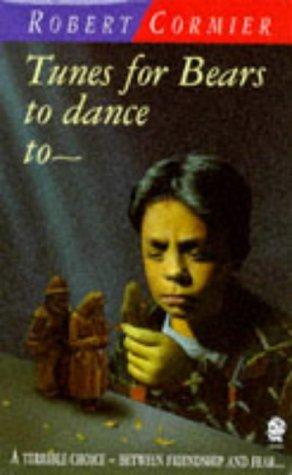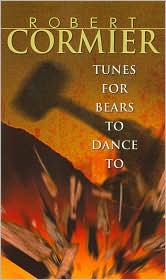
Robert Cormier is a very popular young adult literature writer, and I had not yet been graced with his work until very recently. I know he is most popular for I Am the Cheese and The Chocolate War, but I read Tunes for Bears to Dance To, perhaps not one of his most popular books. However, it's on my to-teach list for my new school, and I think it's definitely teach-worthy.
Tunes for Bears to Dance To takes place after World War II. Our main character Henry, eleven years old, has just experienced the death of his brother. His father is so depressed that he quits work and falls into a deep depression that later will need to be hospitalized. His mother works overtime at a local restaurant as a waitress and is not given enough wages or respect at her job.
Henry then must earn money as he works in a local grocery store for a man named Mr. Hairston. Mr. Hairston, as we come to find out, is a bigot and is prejudiced against Jews, an antisemite. As Henry works for the store, he starts to notice a strange neighbor, an old man named Mr. Levine. Wondering about him, he starts to follow him around to see what crazy things he does. He follows him to a craft center where he is pulled in to meet the man.
Mr. Levine, we come to find out, is really not all that crazy. Mr. Levine used to be in a concentration camp, and he comes to the craft center to recreate his childhood. He makes exact replicas of the people and places that he remembers out of wood. Henry is blown away by his talent, and later he slips this information to Mr. Hairston who seems overly interested in the whole affair. We also notice Mr. Hairston's daughter coming into the store bruised, showing that he is abusive in the home. Henry desperately wants to help her out but can't.
Later on, Mr. Levine wins an art contest for his wooden replicas. He even crafts a wooden duck for Henry. Angry about the award, Mr. Hairston fires Henry but will take him back to work on one condition: he must smash the wooden figurines to pieces. In addition, Mr. Hairston will pay for the stone memorial that does not exist on Henry's brother's grave because they can't afford it, and he will give his mother a better paying job with better hours. If Henry does not comply, he will lose his job, he will have his mother lose his job, he will blacklist Henry for other businesses in town, and he will give a bad report to Henry's principal.

Henry is really in a pickle here. He contemplates what to do for a long time. When it comes down to it (SPOILER ALERT), he chooses to smash the town. Henry is beside himself, but when he confronts Mr. Hairston, he can't accept all of the wonderful gifts from doing the deed because he realizes the reasons that Mr. Hairston wanted him to do it: he hates Jews and he wanted to "break" the goodness in Henry. Henry quits and doesn't accept the gifts. Shortly afterwards, his family moves out of town because they can't deal with the trauma of their long lost son/brother.
The book is really short and really interesting. I had to keep reading because I wanted to see what was going to happen. And, it's a pretty easy read. I'm starting off the year on this book because it's coherent, short, and easier. I like the connection to bigotry and the Holocaust, since we still see so much prejudice in the world today. Will it ever go away?
I can see why Cormier is such a popular author. His books are brief, interesting, and can connect with teenagers. They are deep enough that readers can have in-depth conversations, but they aren't too shallow that the conversation would falter quickly.
For an assignment, if allowed, I was thinking I might focus on this essential question: What can we learn from our elders? We can learn about the past, about life lessons, and we can also learn what not to do. In order to demonstrate this, I was hoping to invite in adults, relatives, and neighbors of my students to come in and talk about some life lesson. The students would take notes and write a short essay on the life lesson/theme they took from one of the speakers and another short essay on what theme they took from one character in the story. Hopefully I can get this approved.
It's a good read. I would recommend this to young readers, especially those interested in history and the Holocaust. There isn't TOO MUCH information on the Holocaust, but it still is a central part of the book.
What do you think of Tunes for Bears to Dance To?


7 comments:
I had to read the book for a project in english class. I thought it wad dumb and a waste of time.
Same Here it was A PIECE OF....... well u know
no, i thought it was interesting! a good discussion on the issues of morality and injustice
thanks for your overview!
in my case the age of this author is the most impressive fact, I mean this men write like a older person, the maturity level in he is not the usual.
no, i thought it was interesting! a good discussion on the issues of morality and injustice thanks for your overview!
Peculiar article, exactly what I wanted to find.
Look into my web site unlock iphone 4s price
off white outlet
golden goose outlet
cheap golden goose sneakers
Post a Comment